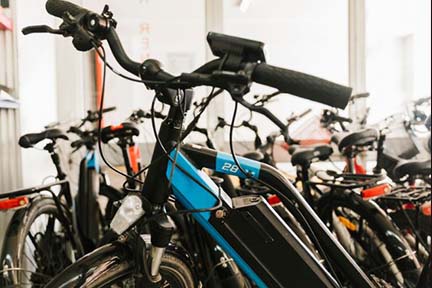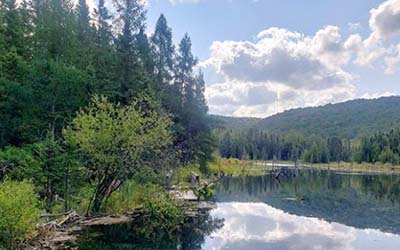Allowable e-bike operation expands under DNR land use order change
Provisions of change in effect immediately after today’s approval
By HEATHER JOHNSON DUROCHER
Trails and resources writer, Parks and Recreation Division
Michigan Department of Natural Resources
Allowable use of Class 1 electric bicycles on state-managed, nonmotorized bicycle trails/pathways has expanded following approval of a proposed Michigan Department of Natural Resources land use order.
DNR Director Scott Bowen approved the land use order change today during the Michigan Natural Resources Commission’s monthly meeting, which was held at the Cadillac Place Building in Detroit.
 “This decision opens our trails to be even more inclusive, providing opportunities to those unable to bike without assistance who want to continue riding and enjoying the outdoors,” said Ron Olson, chief of the DNR’s Parks and Recreation Division. “We anticipate all bikers and trail users will continue to practice appropriate trail etiquette so all users can be safe and enjoy the expansive natural-surface trail system.” “This decision opens our trails to be even more inclusive, providing opportunities to those unable to bike without assistance who want to continue riding and enjoying the outdoors,” said Ron Olson, chief of the DNR’s Parks and Recreation Division. “We anticipate all bikers and trail users will continue to practice appropriate trail etiquette so all users can be safe and enjoy the expansive natural-surface trail system.”
Definitions and details
An electric bicycle (or e-bike) is a bicycle that has a small rechargeable electric motor that can give a boost to the pedaling rider or can take over pedaling completely.
To qualify as an e-bike in Michigan, the bike must meet the following requirements:
- It must have a seat or saddle for the rider to sit.
- There must be fully operational pedals.
- It must have an electric motor of no more than 750 watts (or 1 horsepower).
Whether you can ride an e-bicycle on a trail depends on several factors, including the e-bike’s class, the type of trail and whether the authority that manages or oversees the trail allows the use.
The DNR land use order approved today goes into effect immediately and expands operation of Class 1 e-bikes so that they are now allowed on improved-surface trails, such as linear trails (paved or gravel/asphalt) as well as natural-surface, nonmotorized bicycle trails/pathways in state parks and recreation areas and on state forest pathways and roads. |
 The prevailing concern about allowing electric bicycles on trails is the question of safety – particularly related to speed. The prevailing concern about allowing electric bicycles on trails is the question of safety – particularly related to speed.
Class 1 e-bikes are pedal-assisted and can go up to 20 miles per hour
In addition, the change now allows operation of Class 2 e-bikes, which are throttle- and pedal-assisted and can travel up to 20 miles per hour, on those trails/pathways open for Class 1 e-bike use for mobility purposes as long as a cyclist had applied for and received a no-cost permit to do so.
Prior to the land use change, Class 1 e-bikes were only allowed on improved-surface trails and roads on state-managed land.
“Today’s director approval makes trail riding easier for people who may not have the physical ability to ride a traditional bike,” said Tim Novak, the DNR’s state trails coordinator. “This includes individuals living with disabilities, older adults and really anyone who wishes to experience some assistance as they ride a bicycle. Class 1 e-bikes require pedaling, providing a great health benefit to riders.”
The DNR is installing signs at trailheads indicating allowable e-bike use.
E-bikes remain prohibited in state game and wildlife areas, on Congressionally authorized trails such as the North Country National Scenic Trail or on these three pathways in the Pigeon River Country in the northern Lower Peninsula: High Country, Shingle Mill and Pickerel Lake.
Class 3 e-bikes, which are pedal-assisted and have a maximum speed of 28 miles per hour, remain prohibited on any state-managed nonmotorized trail. |
 Current law allows for local entities to expand or further regulate e-bike usage in their respective communities. Current law allows for local entities to expand or further regulate e-bike usage in their respective communities.
Informed decision-making process
The land use change comes after many months of research as well as conversation and collaboration among DNR staff and trail user groups, including the League of Michigan Bicyclists and the Michigan Mountain Bike Alliance.
The DNR also gathered feedback on the then-proposed change through a public survey that was open earlier this year.
The League of Michigan Bicyclists and Michigan Mountain Bike Alliance support the land use order change, according to Matt Penniman, who serves as the organizations’ communications and advocacy director.
“Theodore Roosevelt once wrote, ‘I believe in power, but I believe that responsibility should go with power.’ We believe in the power of e-bikes to help more people access Michigan’s incredible mountain bike trails,” Penniman said. “We also believe in the responsibility of riders to follow the rules, practice good trail etiquette and treat our trails with respect.
“Over the past year and a half, the DNR has engaged well with the mountain bike community on this change. We expect a continued responsible approach from the DNR to increase resources for education, enforcement and trail maintenance, in parallel with increased use.”
Nicole Hunt, regulatory unit manager with the DNR, said e-bike use is indeed continuing to grow across the country, with many states approving areas for their use.
“The DNR’s decision to move forward with this land use change wasn’t based on a desire to be trendy, but rather on providing individuals with more recreation options while also being conscientious of our state’s natural and cultural resources,” Hunt said. |
 Considering federal government recognition of e-bike use also was part of the process. Considering federal government recognition of e-bike use also was part of the process.
“The federal government, recognizing the benefit of e-bikes for trail recreation, updated its federal grant funding regulations for nonmotorized, natural-surface trail development to no longer prohibit use of e-bikes on trails developed with federal funds,” Hunt said.
Novak said the DNR also researched how other states are allowing e-bike usage.
“We have benchmarked other states and local trail systems that allow e-bikes on natural-surface, nonmotorized trails, and what we found was there haven’t been issues with conflicts or injuries or unnecessary wear and tear on our natural resources which would cause any reservation in expanding e-bike use,” Novak said.
Hunt said the Arkansas state park system stood out, as it has a vast number of trails, including mountain biking trails, and has allowed e-bikes for years with no issues.
The DNR plans to monitor e-bike usage in the coming months. This will include sharing a new public survey as well as speaking with riders on the trails and with trail user groups during to-be-scheduled virtual public meetings.
More details on these events will be shared soon.
Learn more about e-biking in Michigan, the current e-bike policy on state-managed park land and upcoming e-bike public meetings at Michigan.gov/DNR/Ebikes. |
Check out previous Showcasing the DNR stories in our archive at Michigan.gov/DNRStories. To subscribe to upcoming Showcasing articles, sign up for free email delivery at Michigan.gov/DNREmail.
Note to editors: Contact: John Pepin, Showcasing the DNR series editor, 906-226-1352. Accompanying photos and a text-only version of this story are available below for download. Caption information follows. Credit Michigan Department of Natural Resources, unless otherwise noted.
Text-only version of this story.
Charging: An open charging compartment is shown on an e-bike. It takes about 3.5 hours to fully charge and e-bike with a dead battery.
Class-1: A Class-1 e-bike is shown. These bikes can travel up to 20 miles per hour.
Class-3: A Class-3 e-bike is shown. These bikes have a maximum speed of 28 miles per hour.
Label: A label on an e-bike shows which type it is, how many watts and maximum speed. Such labels are required for e-bikes.
Motor: A motor compartment is shown on a Class-1 e-bike.
Shop: Jacob Douglas, co-owner of Lakeshore Bike in Marquette, moves an e-bike back into a selection of e-bikes at his shop. |








 “This decision opens our trails to be even more inclusive, providing opportunities to those unable to bike without assistance who want to continue riding and enjoying the outdoors,” said Ron Olson, chief of the DNR’s Parks and Recreation Division. “We anticipate all bikers and trail users will continue to practice appropriate trail etiquette so all users can be safe and enjoy the expansive natural-surface trail system.”
“This decision opens our trails to be even more inclusive, providing opportunities to those unable to bike without assistance who want to continue riding and enjoying the outdoors,” said Ron Olson, chief of the DNR’s Parks and Recreation Division. “We anticipate all bikers and trail users will continue to practice appropriate trail etiquette so all users can be safe and enjoy the expansive natural-surface trail system.”
 The prevailing concern about allowing electric bicycles on trails is the question of safety – particularly related to speed.
The prevailing concern about allowing electric bicycles on trails is the question of safety – particularly related to speed.
 Current law allows for local entities to expand or further regulate e-bike usage in their respective communities.
Current law allows for local entities to expand or further regulate e-bike usage in their respective communities.
 Considering federal government recognition of e-bike use also was part of the process.
Considering federal government recognition of e-bike use also was part of the process.





 If you have a passion for the natural world and want to learn more about how to care for it and inspire others to do the same, consider signing up for
If you have a passion for the natural world and want to learn more about how to care for it and inspire others to do the same, consider signing up for  See more pictures by
See more pictures by 

